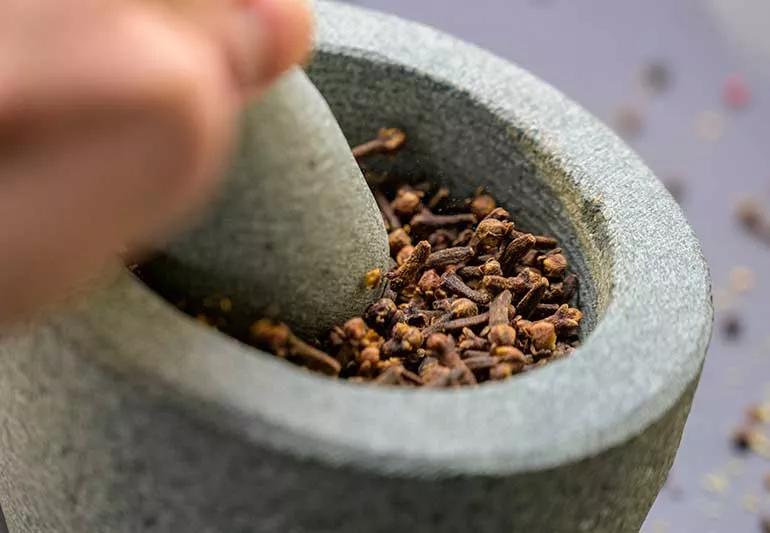Cloves contain eugenol, which may have anti-inflammatory and antibacterial properties

Cloves are a useful spice that add warmth and sweetness to baked goods, sauces, meat rubs, marinades and drinks. Some people also use the dried flower buds and the leaves, stems and oil from clove trees to promote healing.
Advertisement
Cleveland Clinic is a non-profit academic medical center. Advertising on our site helps support our mission. We do not endorse non-Cleveland Clinic products or services. Policy
Cloves are a popular herb therapy among people who use traditional Chinese medicine and Ayurvedic medicine. The spice comes from an evergreen tree that grows in East African and Southeast Asian countries.
Functional medicine specialist Erik Modlo, MD, reviews the potential health benefits of cloves, as well as what to watch out for.
A chemical in cloves called eugenol gives the spice its distinct aroma. Eugenol is especially strong in clove oil, a type of essential oil or concentrated plant extract. “Eugenol may have anti-inflammatory and antibacterial properties,” says Dr. Modlo. “Consuming cloves in small amounts in foods isn’t harmful. But there isn’t enough scientific evidence to support its use for medicinal purposes.”
According to the U.S. Department of Agriculture, one teaspoon of ground cloves is 6 calories and has approximately:
So, are cloves good for you? This spice is definitely a healthier addition to your diet than, say, enriched white bread or cane sugar. But while cloves have been used for thousands of years, the scientific data just isn’t there to support many health benefits — at least yet — until more studies are done. That said, while the research to-date is mixed, here are some potential health benefits of cloves:
Advertisement
One study suggests that an herbal mouthwash made with cloves, basil and tea tree oil can reduce bacteria in your mouth. This bacteria causes dental plaque, cavities and gum disease.
But the India-based study compared this herbal mouthwash with an essential oil mouthwash. These aren’t the same mouthwashes you buy at your local drugstore with the American Dental Association (ADA) Seal of Acceptance. This seal indicates a product is safe and effective at promoting good oral health. So, we don’t know how the clove-based herbal mouthwash compares with ADA-endorsed mouthwashes.
An older study found that a homemade gel made with clove oil worked as well as benzocaine (and better than placebos) to numb gums before dental procedures. And some people apply clove oil directly to their gums to ease toothache pain, but this is a treatment Dr. Modlo cautions against. “Clove oil can be irritating. It may cause burning and inflame your gums.”
One non-human study suggests that eugenol in cloves may lower blood sugar levels. But taking clove supplements when you have diabetes could be dangerous. “Combining eugenol with insulin medications may cause blood sugar levels to drop too low,” warns Dr. Modlo. Severe hypoglycemia (low blood sugar) can be life-threatening.
Several laboratory (test tube) studies suggest that clove oil, clove extract and, specifically, eugenol may have cancer-fighting properties. But the studies used highly concentrated amounts of clove compounds that would be dangerous (toxic) to people. More research is needed to see if there are any cancer-protecting effects from eating small amounts of cloves as part of a healthy diet.
One study found that clove oil worked better than petroleum jelly and a placebo at soothing itchy skin. But some people experience burning and skin irritation after applying clove oil or clove oil products directly to their skin.
Breathing in steam from cloves boiled in water may open stuffy nasal passages when you have a cold or other respiratory illness. And people who follow traditional Chinese medicine often chew cloves to ease sore throats and coughs.
Clove oil can be toxic when ingested. Children who consume even small amounts of clove oil are at risk for liver damage and seizures. Keep clove products away from children’s reach.
You should avoid clove products if you:
Advertisement
Some people soak or boil cloves in water to release their compounds and then drink the clove water. “Compared to traditional drinks like mulled ciders made with cloves and other spices, clove water is likely to have higher concentrations of eugenol and other compounds,” states Dr. Modlo. “I don’t recommend drinking clove water because there’s no way to know how much eugenol you’re getting. Plus, there’s no evidence that it’s good for you.”
But Dr. Modlo is a fan of using cloves as one of many ingredients in drinks, baked goods and other foods. “If you enjoy cloves, there are many ways to include the spice in meals,” he says. “It’s always safer and healthier to get nutrients and vitamins from foods.”
Advertisement

Sign up for our Health Essentials emails for expert guidance on nutrition, fitness, sleep, skin care and more.
Learn more about our editorial process.
Advertisement

The tropical fruit is a good source of antioxidants and vitamin C

High amounts of cholesterol and saturated fat in red meat may be linked to heart disease

The leaves and pods from this tree are rich in essential nutrients

This starchy root vegetable is a staple in many global cuisines — but it has to be prepared correctly, or it can cause serious concerns

These delicate green sprouts can give you an extra dose of vitamin K and other nutrients — but they’re not safe for everyone

Edamame, lentils and chicken breast are good sources of protein

Eating this root vegetable can help support your eye, heart and brain health

The flavorful herb is full of antioxidants that may help regulate blood sugar

Even small moments of time outdoors can help reduce stress, boost mood and restore a sense of calm

A correct prescription helps your eyes see clearly — but as natural changes occur, you may need stronger or different eyeglasses

Both are medical emergencies, but they are very distinct events with different causes